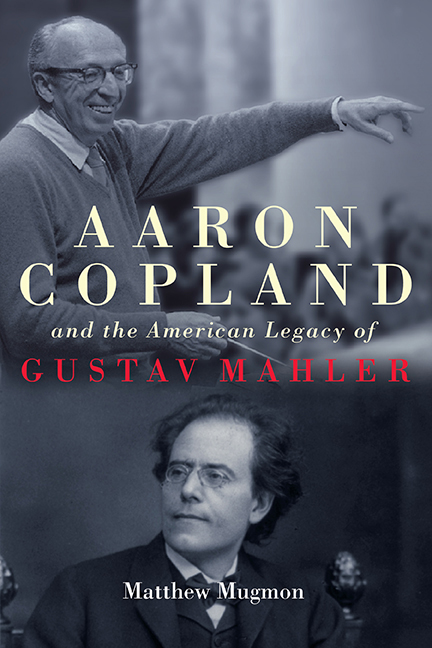Book contents
- Frontmatter
- Dedication
- Contents
- Acknowledgments
- Note on Musical Examples
- Introduction
- 1 Mahler and Copland in New York
- 2 Mahler in Nadia Boulanger's Studio and Beyond
- 3 Copland in Defense of Mahler
- 4 Mahler in Copland's Jewish Romanticism
- 5 Mahler's Idiom in Copland's “American” Sound
- 6 Copland, Koussevitzky, Mahler, and the Canon
- 7 Copland's Role in Bernstein's Mahler Advocacy
- Conclusion
- Notes
- Bibliography
- Index
- Eastman Studies in Music
- Frontmatter
- Dedication
- Contents
- Acknowledgments
- Note on Musical Examples
- Introduction
- 1 Mahler and Copland in New York
- 2 Mahler in Nadia Boulanger's Studio and Beyond
- 3 Copland in Defense of Mahler
- 4 Mahler in Copland's Jewish Romanticism
- 5 Mahler's Idiom in Copland's “American” Sound
- 6 Copland, Koussevitzky, Mahler, and the Canon
- 7 Copland's Role in Bernstein's Mahler Advocacy
- Conclusion
- Notes
- Bibliography
- Index
- Eastman Studies in Music
Summary
In 1925, the composer Aaron Copland (1900–1990), then twenty-four years old, wrote a letter to the New York Times vehemently defending the music of Gustav Mahler (1860–1911) against what Copland viewed as critics’ unmerited attacks on the late-romantic Austrian composer's music. Copland conceded that Mahler's works were sometimes “bombastic,” “long-winded,” “banal,” and beset with “old-fashioned romantico- philosophical conceptions.” These common views of Mahler's music as overwrought and outmoded, he wrote, were “quite justified.” But Copland then made a striking pivot, arguing that it was what the critics “leave unsaid that seems to me unfair.” He was referring to the technical details of Mahler's music, which, according to Copland, placed Mahler squarely in the world of modern composition—and therefore gave his music value. “If one looks at the music qua music,” Copland wrote, “then it is undeniable that Mahler is a composer of today.” Copland's evidence for Mahler's contemporary resonance included his economical orchestration and his polished use of counterpoint, both of which countered Mahler's reputation as an archaic romanticist. Copland cited “so recent a score as [Arthur] Honegger's ‘Pacific 231,’” at the time a sensation in the United States, as “proof of Mahler's living influence.” He singled out movements of Mahler's Fourth, Seventh, and Ninth Symphonies, as well as all of the symphonic song cycle Das Lied von der Erde, as containing “the stuff of living music”—a powerful assertion of Mahler's contemporary relevance.
Despite his endorsement of Mahler, Aaron Copland's name remains synonymous, for many, with a strain of American music composition clearly distinct from Mahler's Austro-German idiom. His studies with Nadia Boulanger in France in the early 1920s primed him to return to the United States and develop a musical language seen as characteristically American, first through the incorporation of jazz and, in the later 1920s, through his use of dissonance and linear writing, with the music of Igor Stravinsky as a clear precedent. In the 1930s, Copland adopted a more accessible style associated with Americana, most notably in the ballets Billy the Kid, Rodeo, and Appalachian Spring. And after World War II, Copland turned, as did many of his colleagues, to twelve-tone composition.
- Type
- Chapter
- Information
- Publisher: Boydell & BrewerPrint publication year: 2019



